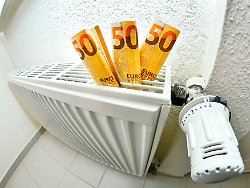Friday 11th December 2020
Mainly two reasons
Inflation rate falls even further below zero
For consumers it is good news, for the monetary authorities it is an alarm signal: prices in Germany are falling. This not only has to do with the VAT cut as a result of the Corona crisis.
The drop in VAT and the sharp fall in energy prices pushed the inflation rate in Germany even further below zero in November. Compared to October 2020, consumer prices fell significantly by 0.8 percent, as the Federal Statistical Office announced. There was also a decrease compared to the same month last year – by 0.3 percent. It was the lowest level since January 2015. The Wiesbaden authority thus confirmed preliminary data. For the fourth time this year, the inflation rate was in the red. In October 2020, a rate of minus 0.2 percent was determined.
Heating oil was significantly cheaper than a year earlier at the beginning of the colder season (minus 35.1 percent). Consumers had to pay 13.1 percent less for fuel than in November 2019. With the corona-induced economic downturn, the prices for crude oil on the world markets have fallen sharply. Without taking energy prices into account, the annual inflation rate would have been plus 0.6 percent, according to statisticians.
For food, consumers had to dig deeper into their pockets in November than a year earlier (plus 1.4 percent). Services rose 1.1 percent. The 1.4 percent increase in basic rents had an impact here, as private households spend a large part of their consumer spending on housing.
Retail wants longer VAT cuts
Since July, lower VAT rates have been in effect in Germany for half a year. The federal government wants to boost consumption in the corona crisis. However, retailers and service providers are free to decide whether and how they pass on the relief to consumers. According to a study by the Bundesbank, consumers benefit from the lower tax rates, especially for food and industrial goods. In the case of services, however, only a third of the reduction was passed on. In the coming year, the withdrawal of the VAT cut should lead to rising prices. In addition, there would be the introduction of CO2 emission certificates and the increase in vehicle tax, explained the Bundesbank in its new economic forecast.
The German Trade Association (HDE) calls for the VAT reduction to be extended after the end of the year so that it can take effect. "For most dealers, the effort involved in the changeover was significantly higher than the benefits," said HDE managing director Stefan Genth recently in the "Wirtschaftswoche" magazine. In many shops, for example, cash register technicians would have had to intervene in the systems and prices would have to be re-awarded. An extension of the measure could "better amortize the effort involved in the changeover". So far, the measure has brought little – for example in trading high-priced goods such as furniture. "The VAT cut has only resulted in a marginal increase in consumption," complained Genth.
Falling or even negative inflation rates are usually an alarm signal for monetary authorities. The European Central Bank (ECB) is aiming for an annual inflation rate of just under 2.0 percent for the euro area with its 19 countries in the medium term. According to the monetary authorities, this is far enough away from zero. If prices are permanently low or falling across the board, this could tempt companies and consumers to postpone investments – in the belief that it may soon be even cheaper. This wait-and-see attitude can slow down the economy.
. (tagsToTranslate) Economy (t) Value Added Tax (t) Inflation (t) Corona Crisis (t) Central Association of German Retailers (t) ECB
